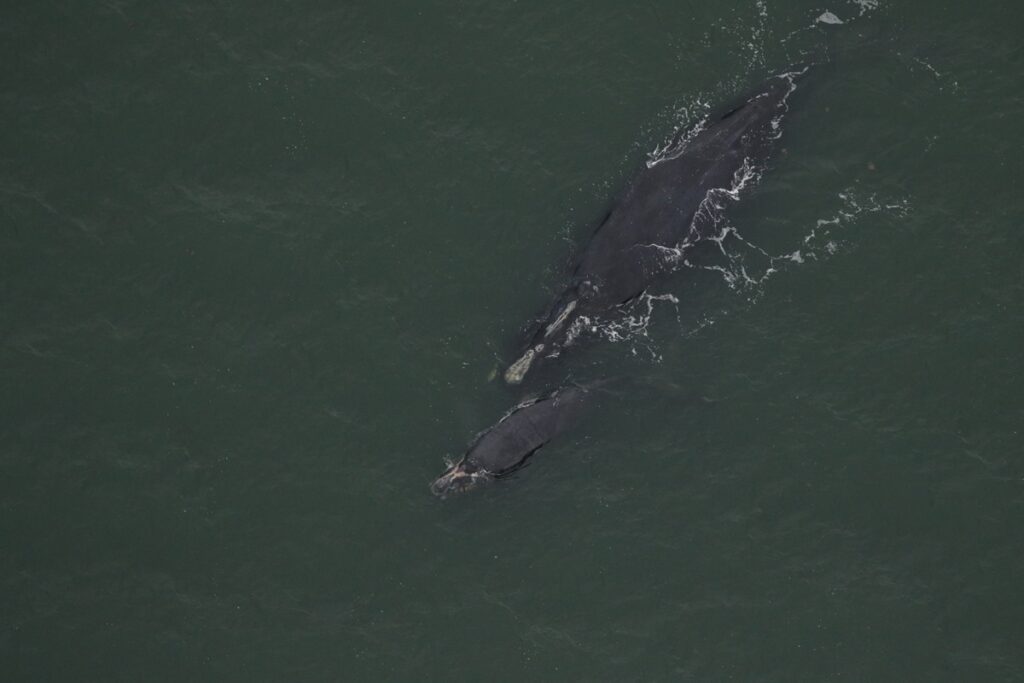June 21, 2024
On the Brink: Female Right Whales and their Calves are in Urgent Need of Protection
Estimated reading time: 0 minutes
BY: Vaishali Dassani
A shocking 40 North Atlantic right whales have died since 2017, each loss brings them closer to extinction and the crisis is not improving. This critically endangered species has faced a disastrous 2024 with a shocking nine whales already dying this year. Female right whales are not only more at risk, but their loss of life and injury is more devastating as they are the future to saving these whales from extinction.
Researchers have observed more deaths among adult females than adult males, leading to gender imbalance that is only contributing to the species survival. Of the only 356 critically endangered North Atlantic right whales left only about 70 are breeding age females. These females, and their calves, are the future of the species. Ship strikes and entanglement in fishing gear are the two biggest threats faced by right whales.
Right whales are dark in colour and don’t have a dorsal fin. They are very difficult for ships to see and avoid collision. Female right whales with calves are more vulnerable to ship strikes as they spend more of their time at the surface of the water nursing.
This is why mandatory vessels slowdowns are imperative in areas where right whales are present, slower ships can reduce collisions and make the impact of strikes that do happen less deadly. Reduced speed may have saved North Atlantic right whale mother #1950 who gave birth to her sixth calf over the winter but then tragically was found dead in March of 2024, her body spotted off the coast of Virginia. Her death is particularly devastating to the population because she was of reproductive age and so had many years ahead of her to calve. It’s not only this year’s calf that’s been lost, but all her future calves as well. The last sighting of her calf was February 16, 2024, off Amelia Island, Florida. It is not expected for the calf of #1950 to survive without its mother.

Picture credit: Right whale#1950 and calf sighted in Jan 11, 2024, off St. Simons Sound, GA;
Credit: Clearwater Marine Aquarium Research Institute, taken under NOAA permit #26919
North Atlantic right whales reach reproductive maturity at about 10 years of age and typically produce one calf after a year-long pregnancy every three to five years. However, in recent years due to stress and trauma caused by fishing gear entanglements and other stressors has now increased the calving interval to 10 years.
The impact of entanglements in fishing gear
When right whales become entangled in fishing gear it can lead to slow and agonizing death. While some right whales manage to free themselves, many face a painful death. On average, it takes a large whale six months to die when lethally entangled. The ropes tighten over time, cutting into their flesh and bones leading to life-threatening infections – in severe cases pectoral fins and tail flukes can be partially amputated. Entanglement makes it difficult to swim, mate, find food and, in some cases, breathe. Many starve while others drown.
As the spring months began right whale return to Canadian waters to feed. The first right whale seen this summer was a female named Shelagh – tragically she was entangled in fishing gear. Shockingly this is Shelagh’s fifth entanglement but luckily was spotted gear free mid-June.
Recent research has found that even minor entanglements can limit a female whale’s ability to breed. Approximately 86% of right whales have scars from entanglement. Therefore, reducing the risk of entanglement is vital to protecting the species. Oceana is calling on the Canadian government to do everything possible to protect these whales from ship strikes and fishing gear entanglement. Vessel slowdowns must be permanent, mandatory and in place across right whales’ full migration route. Transitioning to ropeless and on-demand fishing gear needs to be systematically implemented to allow fishing to continue without putting whales at risk of entanglement.

